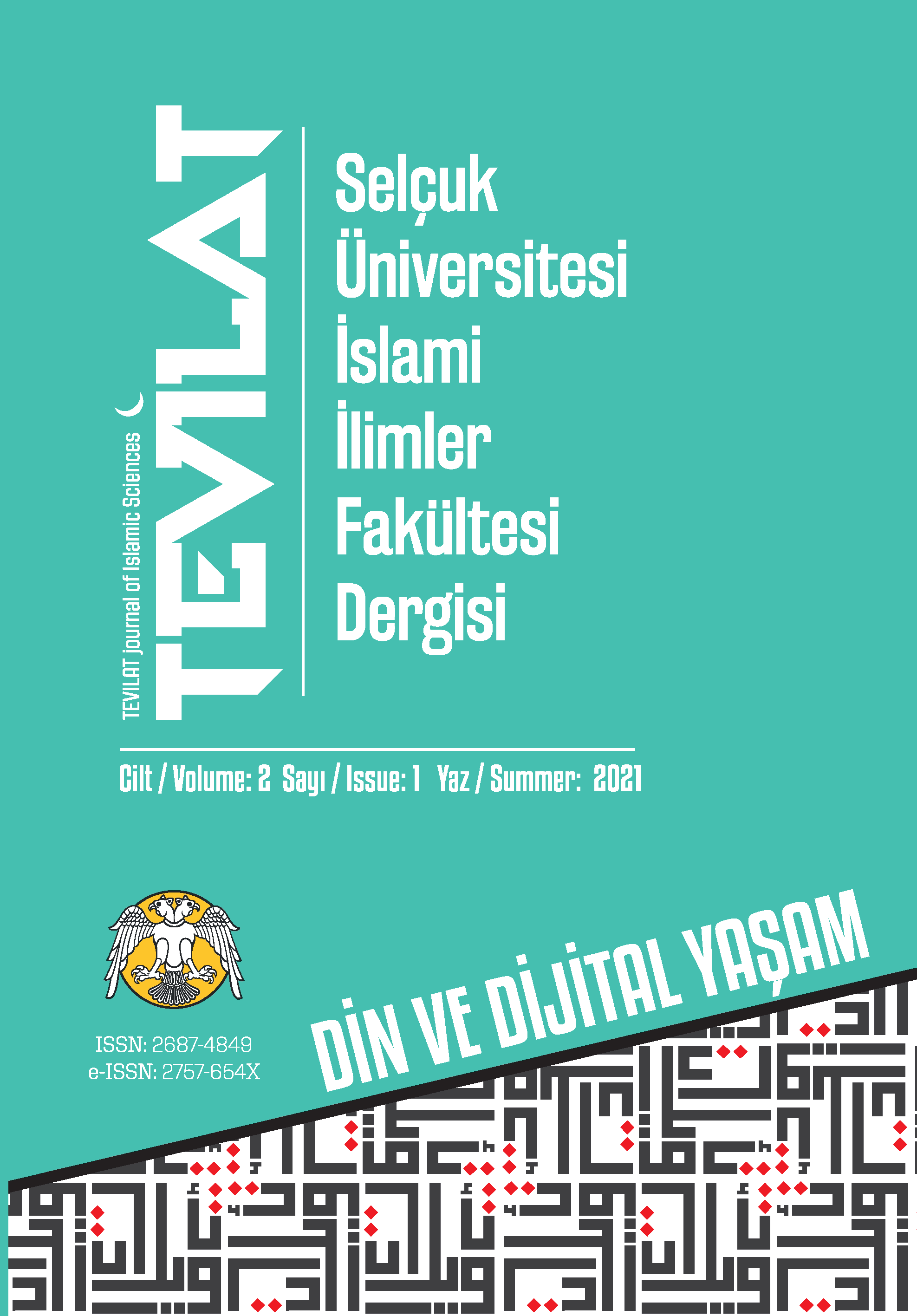İktisatta Farklı Grupların Psikolojisinin Dini Açıdan Önemi
Davranışsal iktisat, iktisat psikolojisi, İslam iktisadı, ihtiyaçların farklılaşması.
Importance of Psychology of Different Groups in Economics from A Religious Perspective
Behavioral economics, psychology of economics, Islamic economics, differentiation of needs.,
___
- Adler, N. E., & Stewart, J. "Health disparities across the lifespan: meaning, methods, and mechanisms." Annals of the New York Academy of Sciences, 1186/1 (January 2010): 5-23.
- Amir, O., Ariely, D., Cooke, A. et al. "Psychology, Behavioral Economics, and Public Policy." Market Lett, 16/443–454 (2005). https://doi.org/10.1007/s11002-005-5904-2
- Beekman, A. T., Deeg, D. J., van Tilburg, T., Smit, J. H., Hooijer, C., & van Tilburg, W. "Major and minor depression in later life: a study of prevalence and risk factors." Journal of affective disorders, 36/1-2 (1995): 65-75.
- Buchanan, J. M., & Tulloch, G. "The calculus of consent: Logical foundations of constitutional democracy." Ann Arbor: University of Michigan Press, 1962.
- Chapra, M. U. "The Islamic vision of development in the light of Maqasid al-Shariah." Jeddah: Islamic Research & Training Institute, 2008.
- Chen, E., Miller, G.E., Kobor, M.S., Cole, S.W. "Maternal warmth buffers the effects of low early-life socioeconomic status on pro-inflammatory signaling in adulthood." Mol. Psychiatry, 16/729–737 (2011).
- Cook, J. A., & Wimberley, D. W. "If I Should Die Before I Wake: Religious Commitment and Adjustment to the Death of a Child." Journal for the Scientific Study of Religion, 22/3 (1983): 222–238. https://doi.org/10.2307/1385967
- Diener, E., & Seligman, M. E. "Beyond money: Toward an economy of well-being." Psychological Science in the Public Interest, 5/1 (2004): 1-31.
- Dorfman, R. "Thomas Robert Malthus and David Ricardo." Journal of Economic Perspectives, 3/3 (1989): 153-164. DOI: 10.1257/jep.3.3.153
- Efe, A. "İslami Perspektifte Ekonomi Psikolojisi." Yönetim Ekonomi Edebiyat İslami ve Politik Bilimler Dergisi, 4/1 (2019): 131-152. DOI: 10.24013/jomelips.477382
- Helfenbein K. G., DeSalle R. "Falsifications and corroborations: Karl Popper's influence on systematics." Molecular Phylogenetics and Evolution, 35/1 (2005): 271-280. ISSN 1055-7903. https://doi.org/10.1016/j.ympev.2005.01.003
- Jost, J. T., Hawkins, C. B., Nosek, B. A., Hennes, E. P., Stern, C., Gosling, S. D., & Graham, J. "Belief in a just God (and a just society): A system justification perspective on religious ideology." Journal of Theoretical and Philosophical Psychology, 34/1 (2014): 56–81. https://doi.org/10.1037/a0033220
- Kahneman, D., & Deaton, A. "High income improves evaluation of life but not emotional well-being." Proceedings of the National Academy of Sciences, 107(38), 16489-16493, (2010).
- Kahneman, D., & Tversky, A. "Prospect theory: An analysis of decision under risk." Econometrica, 47(2), 263-291, (1979).
- Karaoğlu, S. & Basfirinci, C. "Okul Öncesi Çocuklarda Reklâmın Satın Alma Davranışı Üzerindeki Etkileri." Uluslararası Ekonomi ve Yenilik Dergisi, 4(2), 77-96, (2018). DOI: 10.20979/ueyd.430849
- Kasser, T. "The high price of materialism." MIT Press, (2002).
- Kaya, C. & Zaim, H. "Islâmî Değerlerin Çalışan Memnuniyetine Etkisi: Bir Katılım Bankası Uygulaması." İstanbul Üniversitesi İşletme Fakültesi İşletme İktisadı Enstitüsü Yönetim Dergisi, 26(78), 58-86. Retrieved from
- https://dergipark.org.tr/tr/pub/iuiieyd/issue/9209/115626
- Kempen A. "Crime statistics 2018/2019." Servamus Community-based Safety and Security Magazine, vol. 112, No. 11. Retrieved from
- https://journals.co.za/doi/abs/10.10520/EJC-192ca0bdf2, (2019).
- Kübler-Ross, E. "On Death and Dying" (1st ed.). Routledge, (1969). https://doi.org/10.4324/9780203010495
- Kuran, T. "Islamic economics and the Islamic subeconomy." Journal of Economic Behavior & Organization, 95, 251-273, (2013).
- Link, H. C. "The Possibilities of Religious Education." Christian Education, 30(1), 94–102. Retrieved from http://www.jstor.org/stable/41176400, (1947).
- Madge, N., Hemming, P., & Stenson, K. "Youth On Religion: The development, negotiation and impact of faith and non-faith identity" (1st ed.). Routledge, (2014). https://doi.org/10.4324/9781315851068
- Mankiw, N. G. "Principles of economics." Cengage Learning, (2014).
- Mendeş P. İ. & Dönmez T. A. "Davranış Teorilerinin Bireysel, Sosyal ve Normatif Açıdan Kavramlaştırılması: BSN Davranış Modeli Önerisi." İstanbul Üniversitesi İşletme Fakültesi İşletme İktisadı Enstitüsü Yönetim Dergisi, 29(85), 127-186. Retrieved from https://dergipark.org.tr/tr/pub/iuiieyd/issue/42837/517884, (2019).
- Muth, J. F. "Rational expectations and the theory of price movements." Econometrica 29/3 (March 1961): 315-335.
- Nursi, B.S. "The Words." Sözler Publications, Istanbul, Turkey, 1960.
- Oishi, S., & Diener, E. "Can and should happiness be a policy goal?" Policy Insights from the Behavioral and Brain Sciences 1/1 (January 2014): 195-203.
- Piketty, T. "Capital in the Twenty-First Century." The Belknap Press of Harvard University Press, 2017.
- Reynaud, B. L. "Economic Psychology Hardcover." Pierre-Louis Reynaud. ABC-Clio, LLC, USA, 1981.
- Steger, M. F., Frazier, P., Oishi, S., & Kaler, M. "The meaning in life questionnaire: Assessing the presence of and search for meaning in life." Journal of Counseling Psychology 53/1 (January 2006): 80–93. https://doi.org/10.1037/0022-0167.53.1.80
- Steinitz, L. Y. "Religiosity, Well-Being, and Weltanschauung among the Elderly." Journal for the Scientific Study of Religion 19/1 (March 1980): 60–67. https://doi.org/10.2307/1386018
- Sukarieh, M., & Tannock, S. "Youth Rising? The Politics of Youth in the Global Economy." 1st ed., Routledge, 2014. https://doi.org/10.4324/9781315884660
- Thaler, R. "Mental accounting matters." Journal of Behavioral Decision Making 12/3 (July 1999): 183-206.
- Thaler, R. H., & Sunstein, C. R. "Nudge: Improving decisions about health, wealth, and happiness." Penguin, 2008.
- Tøllefsen, I.M., Hem, E. & Ekeberg, Ø. "The reliability of suicide statistics: a systematic review." BMC Psychiatry 12 (January 2012): 9. https://doi.org/10.1186/1471-244X-12-9
- ISSN: 2757-654X
- Yayın Aralığı: Yılda 2 Sayı
- Başlangıç: 2020
2008 ABD Mâlî Buhranının İktisat Sahasındaki Nebevî Öğretiler Açısından Tetkiki
Hz. Yûsuf Kıssası Özelinde Kur’ân’da İktisat Yönetimi ile İlgili Bazı Prensipler
Bir Yatırım Alternatifi Olarak Varantlara Fıkhî Bir Bakış
Pay Senedi Yatırımlarından Elde Edilen Gelirlerin Arındırılmasına Yönelik Fıkhî Bir İnceleme
Bazı Tarım Ürünlerinin “Emanet” Adıyla Satılması ve Bunun İsticrâr Akdi ile İlişkisi
İktisatta Farklı Grupların Psikolojisinin Dini Açıdan Önemi
İslam’da Diyet Uygulaması ve Sosyo-Ekonomik Yönden Değerlendirilmesi
Şer'i Bilginin Epistemik Değeri Açısından Din ve İktisat İlişkisi
